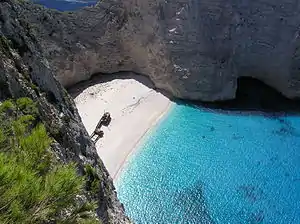Navagio Beach

Navagio Beach (Greek: Παραλία Ναυάγιο, pronounced [naˈvaʝio]), or Shipwreck Beach, is an exposed cove, sometimes referred to as "Smugglers Cove", on the coast of Zakynthos, in the Ionian Islands of Greece. Navagio Beach was originally known as Agios Georgios.
In popular culture
The location was prominently featured in the hit Korean drama Descendants of the Sun, leading to a surge of interest among Chinese and Korean tourists.[1]
History and namesake
On 2 October 1980, the coaster MV Panagiotis, ran aground in the waters around Zakynthos Island on Navagio Beach during stormy weather and bad visibility. Some rumours claim the ship was smuggling contraband; however, official sources did not confirm this, and the captain was not convicted for such offences at the time. Recently released court documents and photos relating to the incident back up the smuggler story, suggesting that Panagiotis was allegedly making its way from Turkey with a freight of contraband cigarettes headed for Italy. Encountering stormy weather, the ship ran aground in the cove, where the crew abandoned her to evade the pursuing Navy.[2] After the captain alerted the authorities, 29 locals were convicted of looting the cargo and valuable equipment from the wrecked ship.[3] The ship was abandoned and still rests buried in the limestone gravel of the beach that now bears the nickname Shipwreck.[4]
The beach was briefly closed in 2018, and swimming and boat anchoring were forbidden, after a cliff above the beach collapsed.[5] The beach reopened and anchoring is permitted, but with restrictions out of concerns over future landslides.[6]
In September 2022 another landslide occurred, after a 5.4-magnitude earthquake took place between Kefalonia and Zakynthos.[7] After this the beach was closed to locals and visitors and will remain closed for the whole summer of 2023 till at least September. The decision to prohibit access to the Navagio beach was recommended by a team of experts from the Earthquake Planning and Protection Organization (OASP), following a visit to the site on March 8 2023, as part of a regular reassessment of its safety. Boats will be able to approach but swimming will not be allowed near the beach.[8][9][10]
Gallery
References
- "Latest Drama Hit Creates New Travel Boom". The Korea Bizwire. 26 March 2016. Retrieved 6 July 2018.
- "Η πραγματική ιστορία του Ναυαγίου της Ζακύνθου" [The true story of the Shipwreck of Zakynthos]. Zougla online (in Greek). 14 June 2020. Retrieved 2 August 2021.
- Dilouambaka, Ethel. "How Did The World's Most Famous Shipwreck Come To Be?". Culture Trip. Retrieved 26 September 2017.
- Epp, Linda. "Navagio Beach History, Shipwreck and BASE Jumping". Xplorables.com. Archived from the original on 23 August 2015. Retrieved 6 August 2017.
- keeptalkinggreece (14 September 2018). "Zakynthos Shipwreck beach closed until 'further notice'. What's next?". Keep Talking Greece. Retrieved 4 September 2019.
- GCT (23 September 2018). "Navagio Beach reopens to the public for first time since landslide – Greek City Times". Greek City Times. Retrieved 4 September 2019.
- https://greekcitytimes.com/2023/04/09/zakynthos-shipwreck-is-closed/
- https://news.gtp.gr/2023/03/20/controversy-in-greece-over-closure-of-shipwreck-beach-on-zakynthos/
- https://greekcitytimes.com/2023/03/16/zakynthos-navagio-beach-closed/
- https://greekherald.com.au/news/famous-shipwreck-beach-on-zakynthos-to-be-closed-this-summer/

.jpg.webp)
.jpg.webp)
.jpg.webp)
.jpg.webp)
.jpg.webp)

.jpg.webp)

.jpg.webp)


